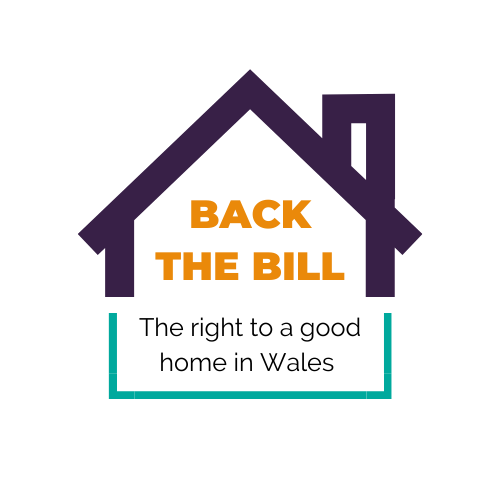If not now, when? – the key milestones ahead for the right to adequate housing
 The Back the Bill coalition has been campaigning to incorporate the right to adequate housing in Wales for a number of years. In late 2021, a commitment to a White Paper on the right to adequate housing was included as part of the co-operation agreement between Welsh Government and Plaid Cymru. Find out from Matt Dicks, Ruth Power, and Alicja Zalesinska why the next 12 months are the most crucial of the campaign to date.
The Back the Bill coalition has been campaigning to incorporate the right to adequate housing in Wales for a number of years. In late 2021, a commitment to a White Paper on the right to adequate housing was included as part of the co-operation agreement between Welsh Government and Plaid Cymru. Find out from Matt Dicks, Ruth Power, and Alicja Zalesinska why the next 12 months are the most crucial of the campaign to date.
“If not now then, when?” is a question we often ask ourselves as campaign partners. When there are almost 90,000 people on social housing waiting lists and thousands in Temporary Accommodation – the housing crisis in Wales is inescapable. Too many lives are blighted by inadequate homes. What’s worse is that as well as ruining people’s lives, poor housing costs the NHS in Wales £95 million per year. It is widely recognised that the birthplace of the NHS is Wales, solving a 20th Century endemic issue of poor (public) health. Perhaps it’s time housing in Wales had its equivalent piece of legislation that helps address an equally stubborn problem?
The positive starting point is that Welsh Government recognises its importance. Indeed, earlier this month, the Minister for Climate Change, Julie James, told the Local Government and Housing Committee, “…it’s a fundamental human right that you are adequately housed, and that is the mark of a civilised society that we can adequately house our citizens”.
The next 12 months are absolutely key to this aspiration. While a Green Paper will be published shortly, a White Paper consultation will take place next year. But under current timescales, it is unlikely legislation will be passed this Senedd term meaning proposals won’t be presented until 2027 at the earliest. The question we ask is: why wait?
If housing is something we all agree is a right, then surely now is the time to act. While we recognise that legislation often needs to be carefully sequenced, in this particular circumstance, fronting-up with a right to adequate housing – using it as the fundamental driver for whole-system change – should be the only game in town.
Looking at it the other way – building up to a right to adequate housing – misses the point. Rather than it being the cherry on the top of the cake, it’s the key ingredient. The housing situation in Wales is worsening, not improving, and without fundamental joined-up and strategic reform, we are not going to see the positive change we want for Wales where, over time, everyone has access to a safe, suitable home that they can afford. Tinkering around the edges with individual reforms hasn’t worked to date, so there can be no reason to expect it will in the future.
So, what are the barriers to acting now?
Of course, the right to adequate housing will cost money – but independent cost-benefit analysis has shown that it will deliver savings of £11.5 billion for the Welsh public purse against a cost of £5billion over a 30-year period.
It will mean change for housing and support providers, including local authorities – but this change means doing existing things better and leveraging in additional resources. All local authorities want good homes for their citizens and taxpayers without having to use inappropriate and expensive and unsuitable hotels as Temporary Accommodation.
We also recognise the fear around increased litigation. But hear us out: progressive realisation means the right to adequate housing is realised over time – not overnight. And with the maximum available resource committed, there will be no immediate increase in litigation. Indeed, the outcome is greater supply and better standards. Fear and risk of immediate litigation could also be mitigated through a ‘sunrise clause’ in any future Act, giving the government and public bodies time to progress their policies before the right is justiciable.
For us it’s clear that the time to act and bring about positive, long-lasting change is now. Wales has radical and transformational roots in social justice – Nye Bevan and the creation of the NHS shows this. Housing is the 21st Century equivalent of the NHS – our predecessors did not wait for enough hospitals, doctors, and nurses to form the NHS – they recognised legislation would drive it and got on with it. And that’s the approach we should take now and incorporate a right to adequate housing in Wales.
NOTES:
Matt Dicks is Director of CIH Cymru; Alicja Zalesinska is Chief Executive of Tai Pawb; Ruth Power is Chief Executive of Shelter Cymru. Together, the three organisations represent the ‘Back the Bill’ campaign.